Podcast: Play in new window | Download (Duration: 35:46 — 24.6MB) | Embed
Subscribe: Apple Podcasts | Spotify | Amazon Music | Android | Pandora | iHeartRadio | JioSaavn | Podchaser | Gaana | Podcast Index | Email | TuneIn | Deezer | Anghami | RSS | More

The Practical Guidance of Rules 5-9 – Spiritual Desolation: Be Aware, Understand, Take Action with Fr. Timothy Gallagher
Fr. Timothy Gallagher and Kris McGregor discuss St. Ignatius’ rules on spiritual desolation and distinguishing between the actions of the good spirit and the enemy during the discernment process.
In particular, Rules 5 through 9 provide practical guidance, advising against changes during desolation, promoting active spiritual tools, and addressing the causes and purposes of desolation. Fr. Gallagher makes note of the trial aspect, encouraging patience, and stresses the humility of recognizing spiritual consolation as a gift from God.
Discerning Hearts Reflection Questions:
- How does Ignatius define discernment of spirits, and what is its purpose in our spiritual lives?
- Explore the actions of the good spirit and the enemy in different spiritual situations, such as moving away from God or striving to grow closer to Him.
- How does the good spirit’s biting and stinging impact a person going away from God, and what role does discomfort play in leading them back to God?
- In contrast, how does the enemy attempt to hinder a person growing toward God, and what tactics does Ignatius describe in this scenario?
- Summarize the key points from Rules 5 to 9, focusing on the importance of not making changes during desolation, active use of spiritual tools, and understanding the causes and purposes of desolation.
- How does Ignatius present desolation as a trial, and what opportunities for growth does it offer to individuals experiencing it?
- Explore the significance of working to be patient during spiritual desolation and the encouragement to stay the course.
- What are the three principal causes Ignatius highlights for spiritual desolation, and how does understanding these causes contribute to spiritual growth?
- Reflect on the concept that all spiritual consolation is a gift from God, and how recognizing this truth fosters humility and spiritual maturity.
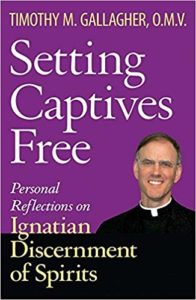
From Setting the Captives Free: Personal Reflections on Ignatian Discernment of Spirits:
“First Rule. The first rule: In persons who are going from mortal sin to mortal sin, the enemy is ordinarily accustomed to propose apparent pleasures to them, leading them to imagine sensual delights and pleasures in order to hold them more and make them grow in their vices and sins. In these persons the good spirit uses a contrary method, stinging and biting their consciences through their rational power of moral judgment.
Second Rule. The second: In persons who are going on intensely purifying their sins and rising from good to better in the service of God our Lord, the method is contrary to that in the first rule. For then it is proper to the evil spirit to bite, sadden, and place obstacles, disquieting with false reasons, so
that the person may not go forward. And it is proper to the good spirit to give courage and strength, consolations, tears, inspirations and quiet, easing and taking away all obstacles, so that the person may go forward in doing good.Third Rule. The third is of spiritual consolation. I call it consolation when some interior movement is caused in the soul, through which the soul comes to be inflamed with love of its Creator and Lord, and, consequently when it can love no created thing on the face of the earth in itself, but only in the Creator of them all. Likewise when it sheds tears that move to love of its Lord, whether out of sorrow for one’s sins, or for the passion of Christ our Lord, or because of other things directly ordered to his service and praise. Finally, I call consolation every increase of hope, faith and charity, and all interior
joy that calls and attracts to heavenly things and to the salvation of one’s soul, quieting it and giving it peace in its Creator and Lord.Fourth Rule. The fourth is of spiritual desolation. I call desolation all the contrary of the third rule, such as darkness of soul, disturbance in it, movement to low and earthly things, disquiet from various agitations and temptations, moving to lack of confidence, without hope, without love, finding oneself totally slothful, tepid, sad and, as if separated from one’s Creator and Lord. For just as consolation is contrary to desolation, in the same way the thoughts that come from consolation are contrary to the thoughts that come from desolation.
Fifth Rule. The fifth: In time of desolation never make a change, but be firm and constant in the proposals and determination in which one was the day preceding such desolation, or in the determination in which one was in the preceding consolation. Because, as in consolation the good spirit guides and counsels us more, so in desolation the bad spirit, with whose counsels we cannot find the way to a right decision.
Sixth Rule. The sixth: Although in desolation we should not change our first proposals, it is very advantageous to change ourselves intensely against the desolation itself, as by insisting more upon prayer, meditation, upon much examination, and upon extending ourselves in some suitable way of doing penance.
Seventh Rule. The seventh: Let one who is in desolation consider how the Lord has left him in trial in his natural powers, so that he may resist the various agitations and temptations of the enemy; since he can resist with the divine help, which always remains with him, though he does not clearly feel it; for the Lord has taken away from him his great fervor, abundant love and intense grace, leaving him, however, sufficient grace for eternal salvation.
Eighth Rule. The eighth: Let one who is in desolation work to be in patience, which is contrary to the vexations which come to him, and let him think that he will soon be consoled, diligently using the means against such desolation, as is said in the sixth rule.
Ninth Rule. The ninth: There are three principal causes for which we find ourselves desolate. The first is because we are tepid, slothful or negligent in our spiritual exercises, and so through our faults spiritual consolation withdraws from us. The second, to try us and see how much we are and how
much we extend ourselves in his service and praise without so much payment of consolations and increased graces. The third, to give us true recognition and understanding so that we may interiorly feel that it is not ours to attain or maintain increased devotion, intense love, tears or any other spiritual
consolation, but that all is the gift and grace of God our Lord, and so that we may not build a nest in something belonging to another, raising our mind in some pride or vainglory attributing to ourselves the devotion or the other parts of the spiritual consolation.”
Father Timothy M. Gallagher, O.M.V., was ordained in 1979 as a member of the Oblates of the Virgin Mary, a religious community dedicated to retreats and spiritual formation according to the Spiritual Exercises of St. Ignatius. Fr. Gallagher is featured on the EWTN series “Living the Discerning Life: The Spiritual Teachings of St. Ignatius of Loyola”. For more information on how to obtain copies of Fr. Gallaghers’s various books and audio which are available for purchase, please visit his website: frtimothygallagher.org




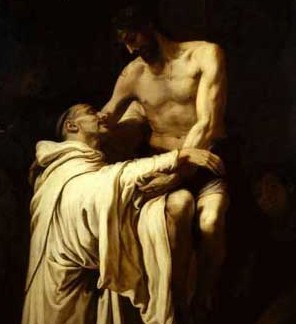
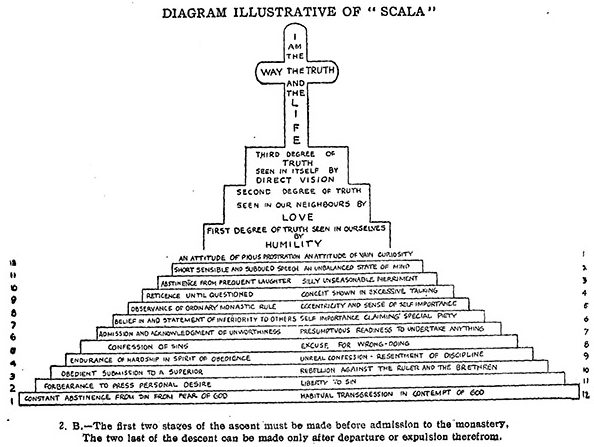 THE TWELVE DEGREES OF HUMILITY
THE TWELVE DEGREES OF HUMILITY


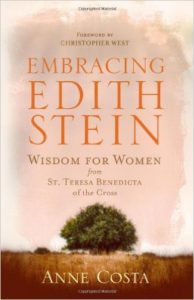
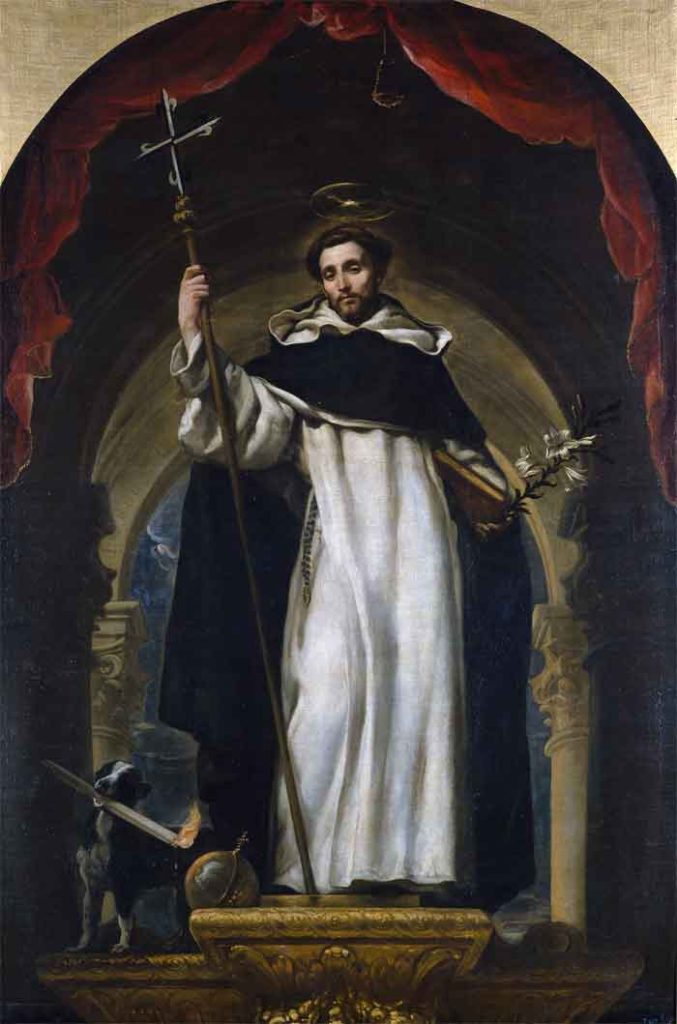 Holy teachers like Augustine, Ambrose, Gregory, Hilary, Isidore, John Chrysostom, John Damascene, Bernard, and other saintly Greek and Latin doctors have discoursed on prayer at great length. They have encouraged and described it, pointed out its necessity and value, explained the method, the dispositions which are required, and the impediments which stand in its way. In learned books, the glorious and venerable doctor, Brother Thomas Aquinas, and Albert, of the Order of Preachers, as well as William in his treatise on the virtues, have considered admirably and in a holy, devout, and beautiful manner that form of prayer in which the soul makes use of the members of the body to raise itself more devoutly to God. In this way the soul, in moving the body, is moved by it. At times it becomes rapt in ecstasy as was Saint Paul, or is caught up in a rapture of the spirit like the prophet David. Saint Dominic often prayed in this way, and it is fitting that we say something of his method.
Holy teachers like Augustine, Ambrose, Gregory, Hilary, Isidore, John Chrysostom, John Damascene, Bernard, and other saintly Greek and Latin doctors have discoursed on prayer at great length. They have encouraged and described it, pointed out its necessity and value, explained the method, the dispositions which are required, and the impediments which stand in its way. In learned books, the glorious and venerable doctor, Brother Thomas Aquinas, and Albert, of the Order of Preachers, as well as William in his treatise on the virtues, have considered admirably and in a holy, devout, and beautiful manner that form of prayer in which the soul makes use of the members of the body to raise itself more devoutly to God. In this way the soul, in moving the body, is moved by it. At times it becomes rapt in ecstasy as was Saint Paul, or is caught up in a rapture of the spirit like the prophet David. Saint Dominic often prayed in this way, and it is fitting that we say something of his method.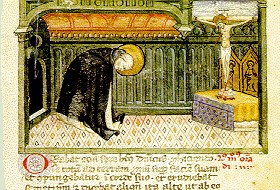 Saint Dominic’s first way of prayer was to humble himself before the altar as if Christ, signified by the altar, were truly and personally present and not in symbol alone. He would say with Judith: “O Lord, God, the prayer of the humble and the meek hath always pleased Thee [Judith 9:16]. “It was through humility that the Canaanite woman and the prodigal son obtained what they desired; as for me, “I am not worthy that Thou shouldst come under my roof” [Matt. 8:8] for “I have been humbled before you exceedingly, O Lord [Ps. 118:107].:
Saint Dominic’s first way of prayer was to humble himself before the altar as if Christ, signified by the altar, were truly and personally present and not in symbol alone. He would say with Judith: “O Lord, God, the prayer of the humble and the meek hath always pleased Thee [Judith 9:16]. “It was through humility that the Canaanite woman and the prodigal son obtained what they desired; as for me, “I am not worthy that Thou shouldst come under my roof” [Matt. 8:8] for “I have been humbled before you exceedingly, O Lord [Ps. 118:107].:
